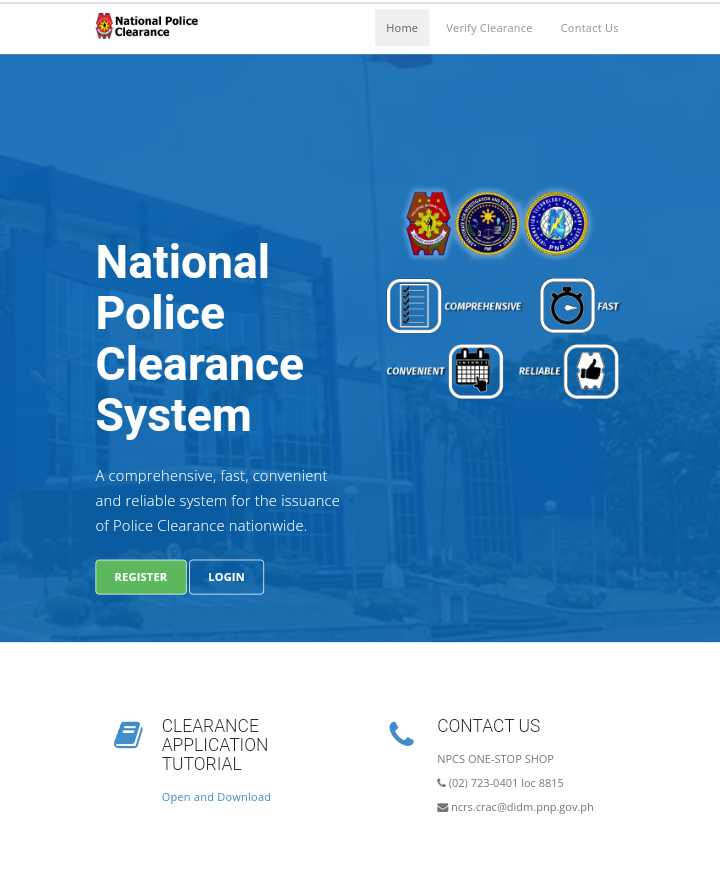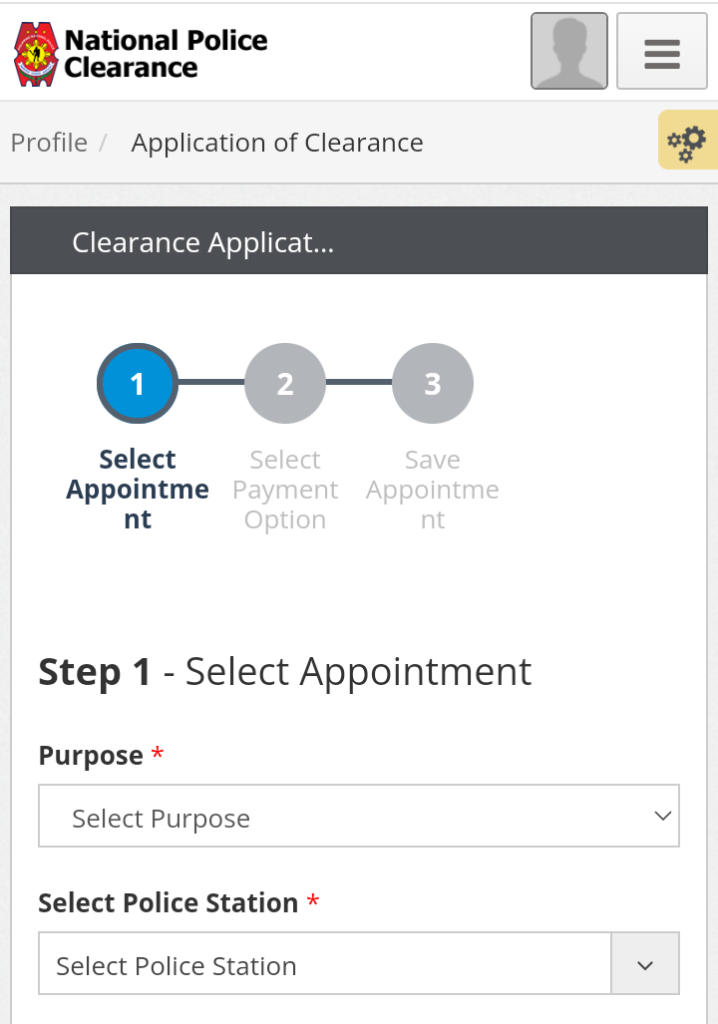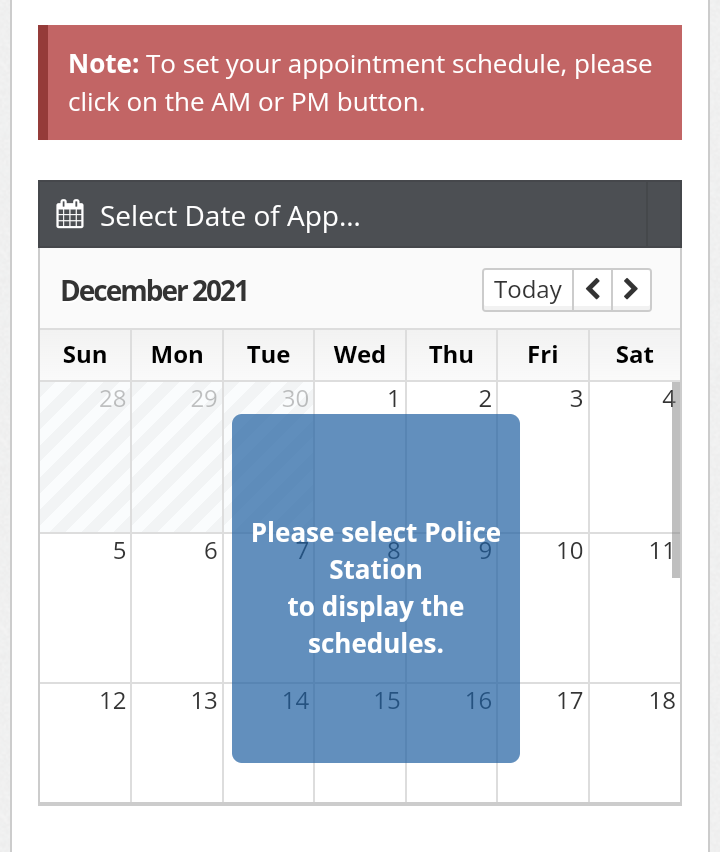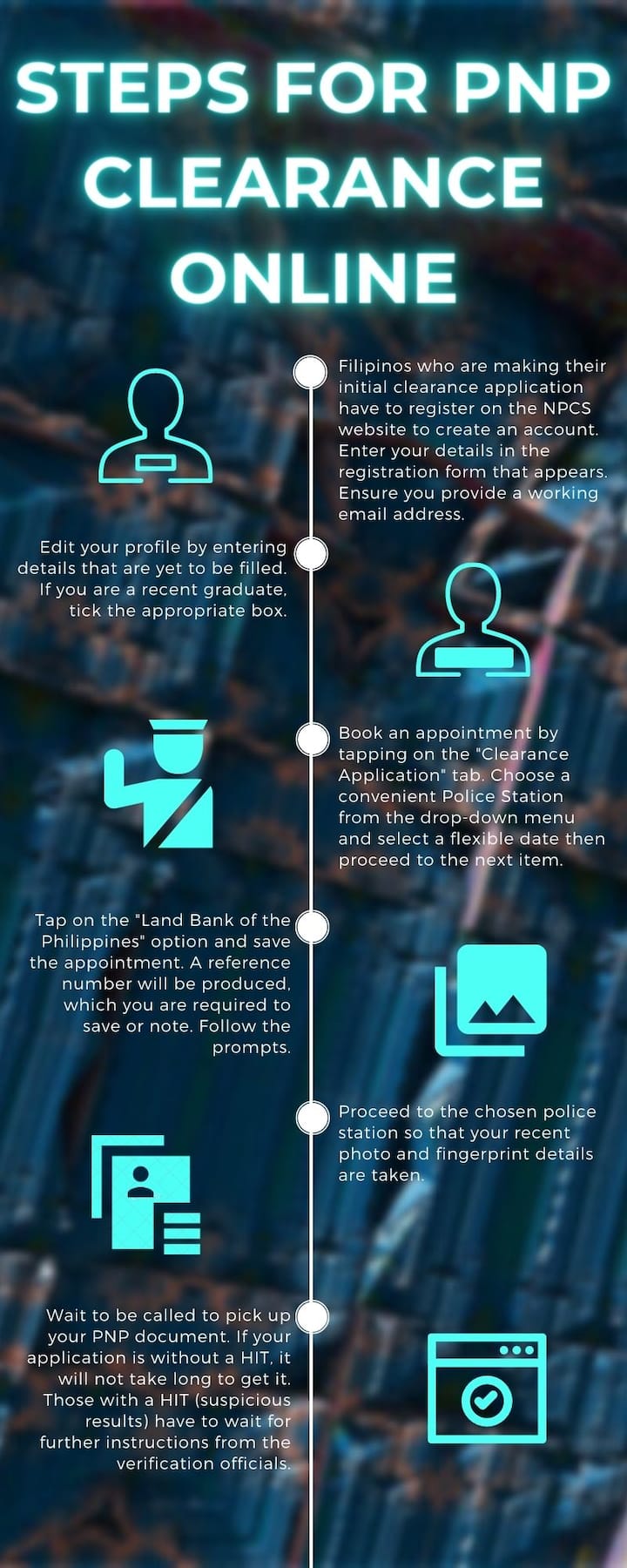Getting a Police clearance certificate (PCC) is a rite of passage for Filipinos aged 18 and up. It is proof of the time they have gone without breaking the law. The PCC is also used to show evidence that they committed no criminal activity of any sort, so it works as strong evidence of character.
So, if you are like those Filipinos who wish to check whether they have a clean record with the police, but you do not have the time or patience to go through the process of filling out paperworks and queuing to wait for documents, here’s a piece of good news for you. You can now get a police clearance certificate quickly and conveniently, with a quick online application at any time.
This is in part, because the Philippine National Police has already made it possible for Filipinos to apply for one via the National Police Clearance System (NPCS) – a public online portal that offers a fast, convenient, and reliable system for the issuance of a clearance.

In this guide, we will get you all up to speed on what you need to know about applying for a police clearance in the Philippines. From how to apply, and what information and documents are needed, to where to get a police clearance certificate and how to obtain one, read on to learn more.
What is a police clearance certificate?
A police clearance certificate may seem unimportant, but the truth is, it really isn’t. As an official document, it is meant to show any criminal records or charges that an individual may have, either in a certain city or municipality or within the entire country. It stands as a document which vouches for an individual’s clean slate.
In the Philippines, it is often required for employment, immigration, and other purposes. The police clearance is a documentary proof of being a law-abiding citizen issued by the local authority, specifically the Philippine National Police (PNP). It’s basically a police-issued certificate of no criminal records or activity, regardless of whether it is an arrest, a conviction, or any type of criminal proceedings.
Why do I need a police clearance in the Philippines?
If you are planning to leave the Philippines for work, study, or immigration purposes, then it is important to obtain this document. Some groups, agencies, and even institutions also require a police clearance before they can issue other legal documents such as ID, passport, or even driver’s license.
Having this document certifies that there are no criminal charges against you. It also proves that you have no pending court cases related to any felony or penal offense and that you have been cleared of any criminal allegations. Lastly, it also certifies that there are no pending warrants on your name and/or record from any court in the country.
Aside from the reasons mentioned above, you may also need a police clearance when applying for the annual civil service exam, registering firearms, applying for a credit card, or applying for various government-issued documents like their birth certificate.
For police officers, however, the centralized clearance system also serves as a means to arrest fugitives who have been hiding for years. We’re not saying you are one, but since it is a typical requirement for employment, there are instances when criminals on the wanted list resurface to apply for police clearance. They could be thinking that the police may have forgotten about their crimes, but it’s quite the opposite. In fact, since the launch of the NPCS, the PNP Directorate for Investigation and Detective Management (DIDM) revealed that they have already arrested up to 36 wanted personalities all over the country.
Types of Police Clearance
The Philippine National Police (PNP) offers a “centralized” system that houses all the criminal records from different towns and cities. That said, criminal record checks can be made from any police station, and from there, they can also issue either one of these two types of clearance:
National Police Clearance (NPC)
The National Police Clearance (NPC) is a lot like the NBI clearance in terms of scope. It counterchecks an individual’s record against a national database to verify if there is an existing record not just in the city or municipality where he lives, but elsewhere in the Philippines. Although comprehensive, this type of police clearance requires an online appointment, and the number of police stations issuing the NPC is limited to a select few.
Local Police Clearance (LPC)
The Local Police Clearance (LPC), on the other hand, is the type of police clearance that checks if the individual has a criminal record within the municipality. It is generally the type that you’d want to get if you are using it to seek employment within the same area. Unlike the NPC, the LPC has limited coverage, so you’d want to check with the requesting authority about whether you need an NPC or an LPC before you actually move forward and apply for one.
Police clearance in the Philippines: Requirements, Costs, Processing Time and Procedures
As mentioned earlier, the PNP has launched an online portal to streamline their services and make the process of applying for a police clearance – whether local or national – easier and simpler. The new NPCS website also helps the PNP reach out to their customers easily, which can be really helpful, especially when done in style.
Who can apply for a Police Clearance Certificate?
Anybody can request for a police clearance, but note that they must:
- Have resided in the locality for 12 months or longer,
- Be at least 18 years of age, and
- Need the certificate within six months or less.
Requirements for applying for a Police Clearance
The PNP clearance only requires two (2) valid ID cards as proof of identity and the IDs should be:
- Valid (not expired)
- Original (not photocopied)
- Bearing the applicant’s complete name, clear photo, and signature
The applicant may choose any two from the following list of acceptable IDs when applying for a police clearance:
- Alien Certificate of Registration (ACR)
- PSA Birth certificate
- GSIS ID
- Driver’s license
- IBP ID
- OFW ID
- Passport
- PhilHealth ID
- PNP ID
- Postal ID
- PRC ID
- School ID with registration form
- Senior citizen ID
- SSS ID/UMID
- TIN ID
- Voter’s ID
If you only have one valid ID, you may present it along with a certified true copy of your birth certificate (and the original official receipt).
If you wish to request for a copy of your PSA birth certificate, you may check this guide on How to Request for PSA Birth Certificate.
How to apply for a police clearance?
- Visit the NPCS website at https://pnpclearance.ph/.
For first-time applicants, you are required to register with the National Police Clearance System website.
To do so, just:
- Click Register. A pop-up box will appear on the screen.
- Choose your preferred language (English, Cebuano, or Filipino).
- Tick the checkboxes to agree to the Terms and Conditions and the Privacy Policy, then click Next.
- Tick the checkbox to agree to the creation of your NPCS account and Profile, then click Next.
- Tick the checkbox to agree to the terms relating to Forfeiture of Payment and Cancellation of Transaction and Clearance Printout then click Next.
- Take note of the list of acceptable IDs and the police clearance Validity notice, then click I Agree.
- Fill out the New Applicant Registration form with your email address and password, complete name, gender, and birth date.
- Tick the box for “Terms and Conditions.”
- Finally, click Register.
- A warning box will then appear to remind you to check the information you’ve provided before proceeding.
- If you’re sure that all the information you provided is correct, click “Save”. Otherwise, click “Cancel”.
- Once registered, you may log in to access your account.
Use the email address and password you’ve just provided during registration to log in.
- After logging into your NPCS account, click on “Edit Profile.”
- Fill out the “Applicant Information” form by providing the information in the required sections.
This includes information on your Nationality, Birth Place, Civil Status, Address, Mobile/Telephone Number, Height, Weight, Complexion, Educational Attainment, and Family Background.
For PWD applicants: If you are a PWD, make sure to tick the checkbox that says “Please check if you are a PWD” and provide your PWD ID number.
For first-time applicants: If you’re a fresh graduate looking to apply for a police clearance for your first job, do not forget to tick the checkbox that says, “Please check if you are a First Time Job Seeker (RA 11261 – First Time Job Seeker Assistance Act)”. This will waive the police clearance fee, enabling you to avail of the provisions of RA 11261, enabling all first-time jobseekers to acquire all government-issued documents for free. Note that this is a one-time only privilege applicable to first time jobseekers. To avail the free police clearance, you will need to present a Barangay Certificate certifying that you are a first-time jobseeker.
- Review all the information you’ve provided for accuracy. Make sure to check for any missing, misspelled, or erroneous data as this information will be shown on the printed police clearance. Once you’re done, click “Save Profile.”
- Click the “Clearance Application” button to start with the clearance application and make an appointment at your preferred police station.

- Choose the police station closest to you from the drop-down list, as well as your preferred date and time from the list of available schedules then click Next to set an appointment.

- Choose your preferred payment option.
To do so:
- Select “LandBank of the Philippines.”
- Then, under Payment Options, you should see the police clearance fee amounting to Php 150. You will need to pay this amount to secure your appointment. For first-time jobseekers, the fee will be waived at the police station on the day of your appointment.
- Then, click Next.
- Review the notes/reminders and pay the police clearance fee. You should also see a summary of your transaction including your preferred police station, schedule, payment option, and instructions on what to do next.
- After reviewing the information, click “Save Appointment”.
- Take note of the reference number displayed on the page, then proceed with payment by clicking the button that says, “Click here to Pay.”
- You will be directed to the LandBank of the Philippines ePayment portal.
- For those who opt for bank transactions: You may select either LandBank or Bancnet (for those with non-LandBank accounts), then enter your account number and PIN to complete the transaction.
- For over-the-counter payments: In case you don’t have a bank account, you may opt to pay the police clearance fee over the counter at the nearest 7-Eleven convenience store.
- For e-wallet/e-money payments: You may also pay the fee via GCash. To pay the police clearance fee using your GCash account, enter your GCash number on the LandBank of the Philippines ePayment portal. The transaction details and payment summary will be subsequently shown.
Note: You will have to complete the payment at least two banking days prior to your appointment date or the transaction will be automatically canceled.
- For first-time jobseekers: There is no need to proceed with the payment. You just need to go directly to the police station on your appointment schedule and present your First Time Job Seeker Barangay Certificate.
- On the day of your scheduled appearance, visit your preferred police station for photo capture and biometrics.
Do not forget to bring the Official Receipt (OR), two (2) valid IDs, and a copy of your payment Reference Number and present it to the Clearance Police Non-Commissioned Officer (PNCO).
- Once you’re there, proceed to the designated area for photo-capture, fingerprint-taking, and collection of your digital signature.
- Wait while your application goes through a verification process.
This will not take much time as all police stations are now connected to the centralized PNP database. The only time it will take longer is if you have a “HIT” on your police clearance, which is most probably due to a namesake.
Note that a “HIT” on your police clearance is different from a “HIT” on your NBI clearance which requires at least two weeks to verify. That said, unless you are involved in a criminal activity or you have an active arrest warrant, the “HIT” on your police clearance can be resolved within minutes.
- Wait for your police clearance certificate to be printed and released.
Unlike other government-issued documents, police clearance certificates do not require a long waiting period. PCCs are released on the same day of application. In some cases, the entire process does not even take more than 15 minutes, though it sometimes varies depending on the police station.
- Once the verification process is complete, wait for your name to be called for the release of your police clearance.
Where to get your PCC or Police Clearance Certificate in the Philippines?
When applying for a police clearance certificate, you may choose any of the many police stations all over the country. If you are unsure whether the police station near you issues a clearance, then you may simply scroll through the dropdown list on the NPCS website when selecting your preferred station.
How long is the validity of a police clearance?
The police clearance certificate is valid for only six months. Each clearance bears a unique QR code that ensures its authenticity, so make sure you request for one at the right time for your needs.
How long does it take to get one in the Philippines?
The photo-capture, fingerprinting, verification, and processing of the police clearance doesn’t take a lot of time. At times, it takes no more than 15 minutes to get through the entire process before the release of your police clearance. However, make sure that you make an online appointment and complete the application form on the NPCS website.
How to renew my police clearance?
Note that unlike the NBI clearance, the police clearance is not renewable in the Philippines. That means, once your clearance expires (which happens six months from release), you have to apply for a new police clearance through the NPCS by following the same steps above.
How to verify your police clearance online?
If you or someone else wishes to verify the authenticity of your police clearance, this can be done via the NPCS as well.
To do this, just follow these steps:
- Visit the NPCS website.
- From the home page, scroll down to the section that says Verify Your Clearance.
- Type in the surname and the clearance number printed on the police clearance
- Tick the reCAPTCHA box.
- Then, click Verify.
How much does it cost for a police clearance in the Philippines?
The Police clearance certificate costs PHP 150. Plus, depending on your preferred payment channel, there is an extra transaction fee. If you choose to pay via 7-Eleven, the transaction fee amounts to PHP 30 (for a total of PHP 180).
Important things to know when getting a police clearance in the Philippines
- A missed appointment doesn’t automatically cancel your police clearance application.
- You can no longer edit or change erroneous personal data on your police clearance once it’s already printed.
- It is possible to verify the authenticity of your police clearance online.
- Police clearance applications are only accommodated during weekdays. There is no available schedule for police clearance issuance on weekends and holidays.
- Police clearance can’t be renewed once it expires. You may only apply for a new one again, but you do not have to register on the NPCS website every time. If you need to apply for a police clearance again, simply log into your account and initiate a new clearance application transaction by following the steps listed above.
- Note that the police clearance only proves that there are no criminal cases – active or pending – against you. Like the NBI clearance, the police clearance doesn’t cover civil cases or private disputes between individuals and organizations so if you are involved in one, you will still be able to get a police clearance issued when you request for one.
Frequently Asked Questions (FAQs)
How do I authenticate my police clearance with a DFA red ribbon if I am using it to apply for work abroad or for immigration purposes?
To get your police clearance authenticated by the DFA, you must bring the original Police Clearance/Sundry issued by Philippine National Police (PNP) on the day of your scheduled appointment, then follow these steps:
- PRINT and present your confirmed appointment letter to the Appointment Verification Counter (Window 1).
- Bring the original Police Clearance/Sundry issued by Philippine National Police (PNP) then proceed to the processing window.
- Present your valid government-issued ID (original and photocopy) along with the original Police Clearance/Sundry issued by Philippine National Police (PNP) to the processor for assessment.
- Pay the fees for authentication to the Cashier.
- Bring your original valid government-issued ID and the official receipt and claim the document on the scheduled date and time of release.
For a more detailed instruction on how to get your documents authenticated by the DFA, please check this article on Apostille: Step-by-Step Guide to Authenticate Documents in DFA.
Is the police clearance the same as the NBI clearance?
No. The police clearance and the NBI clearance are two different documents. To learn more about the difference between the two, check this article on How to Apply for a Barangay Clearance, Police Clearance, NBI Clearance.
I’m a Filipino/foreigner who lived in the Philippines but is now based in another country. Can I apply for a police clearance certificate while I am abroad?
Yes. You may register and log in to the NPCS website, then secure an appointment at the consulate near you. However, if you are based in countries other than Canada, the US, Australia, and New Zealand, and you are asked for a police clearance, you are most likely being required to secure its more comprehensive cousin, the NBI clearance.
To learn more about applying for an NBI clearance while abroad, read this guide on How to Get an NBI Clearance Even When Working Overseas.
How can I pay the police clearance via 7-Eleven? Is there any other payment option?
- Upon landing on the LandBank of the Philippines ePayment portal, select “Cash Payment” as your preferred payment mode then click “Submit.”
- Review the Transaction details, then tick the box and agree to the Terms and Conditions.
- Click “Submit”.
- From the LandBank portal, you’ll be directed to the MyEG Philippines payment gateway where you’ll be asked to choose your preferred payment method from three choices: ECPay, Bayad Express, or 7-Eleven.
- Select 7-Eleven, taking note of the exact date and time when the payment is due (Make sure to make the payment at 7-Eleven before this date, otherwise the transaction will be invalid).
- Review the “Payment Details” and click “Proceed”
- Copy and save your payment reference number when the “Payment Result” page will be displayed showing a summary of your transaction, including the reference number which you’ll need in order to make the payment at 7-Eleven.
- Then, go to the nearest 7-Eleven at the Cliqq kiosk or download the Cliqq app.
- Choose Pay Bills, then select government payments.
- Then search and select MyEGPH Philippines payment gateway as your biller name.
- Then, enter your reference number and the amount to pay, and present the barcode to the cashier for payments.
For other payment options, note that the NPCS website only allow online payments. Despite that, there are ither payment options like online bank transfer from Landbank or other non-Bancnet banking apps.
What happens if I miss my scheduled appointment date for police clearance?
Originally, failure to show up for your police clearance appointment only allows you to do so within the next 15 days before the payment is forfeited and you are required to re-apply. Now, the NPCS website allows you to login and move your appointment date to a new one without extra fees.
How to Contact the Philippine National Police?
In the event of any other unanswered questions or concerns, you may also reach out to the Philippine National Police (PNP) Directorate for Investigation and Detective Management (DIDM) at the following address:
Philippine National Police
Directorate for Investigation and Detective Management
NHQ Building
Camp Crame, Quezon City
(02) 723-0401 loc 8815
You may also contact them via their helpline by calling the NPCS one-stop shop at (02) 723-0401 loc 8815.
Or, you may opt to email your concerns to ncrs.crac@didm.pnp.gov.ph.

Conclusion
Getting a police clearance in the Philippines while abroad is an essential part of adulting especially in the Philippines. It’s not a difficult process too, as you most likely already found out while reading through this guide. That said, there is no reason to opt for the services of fixers or those who are offering to provide “assistance” so you may secure your documents faster. In fact, there is no reason to even forge this type of document unless you have an active criminal case or warrant of arrest. In any case, we hope this helped make the process just a little bit easier for you.
If you have any questions or if you have other useful information regarding your experience in requesting for a police clearance, please feel free to share it with us in the comment section.